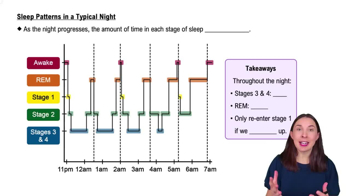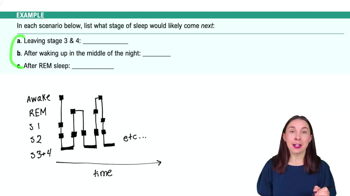Table of contents
- 1. Introduction to Psychology1h 43m
- 2. Psychology Research2h 20m
- 3. Biological Psychology2h 41m
- 4. Sensation and Perception28m
- 5. Consciousness and Sleep32m
- 6. Learning41m
- 7. Memory34m
- 8. Cognition37m
- 9. Emotion and Motivation35m
- 10. Developmental Psychology33m
- 11. Personality48m
- 12. Social Psychology41m
- 13. Stress and Health41m
- 14. Psychological Disorders44m
- 15. Treatment47m
5. Consciousness and Sleep
Sleep
Struggling with Psychology?
Join thousands of students who trust us to help them ace their exams!Watch the first videoMultiple Choice
As people age, what happens to the body's BMR and weight set point?
A
BMR increases, and weight set point decreases.
B
BMR and weight set point both increase.
C
BMR and weight set point both decrease.
D
BMR decreases, and weight set point increases.
 Verified step by step guidance
Verified step by step guidance1
Understand the concept of Basal Metabolic Rate (BMR): BMR is the rate at which the body uses energy while at rest to maintain vital functions such as breathing and keeping warm.
Recognize that as people age, their metabolism tends to slow down, which means the BMR generally decreases. This is due to factors like loss of muscle mass and hormonal changes.
Learn about the weight set point theory: This theory suggests that each individual has a genetically determined range of weight that their body tries to maintain.
Acknowledge that with age, the weight set point may increase due to changes in body composition, lifestyle, and metabolism, leading to a higher natural weight range.
Combine these concepts to understand that as people age, the BMR decreases due to a slower metabolism, and the weight set point increases as the body adjusts to changes over time.

 3:25m
3:25mWatch next
Master Circadian Rhythms with a bite sized video explanation from Hannah Gordils
Start learningRelated Videos
Related Practice


































































































![Race, Genes and IQ Differences | Bret Weinstein [Mini Clip]](https://img.youtube.com/vi/IztL_m3pd70/mqdefault.jpg)



































































































